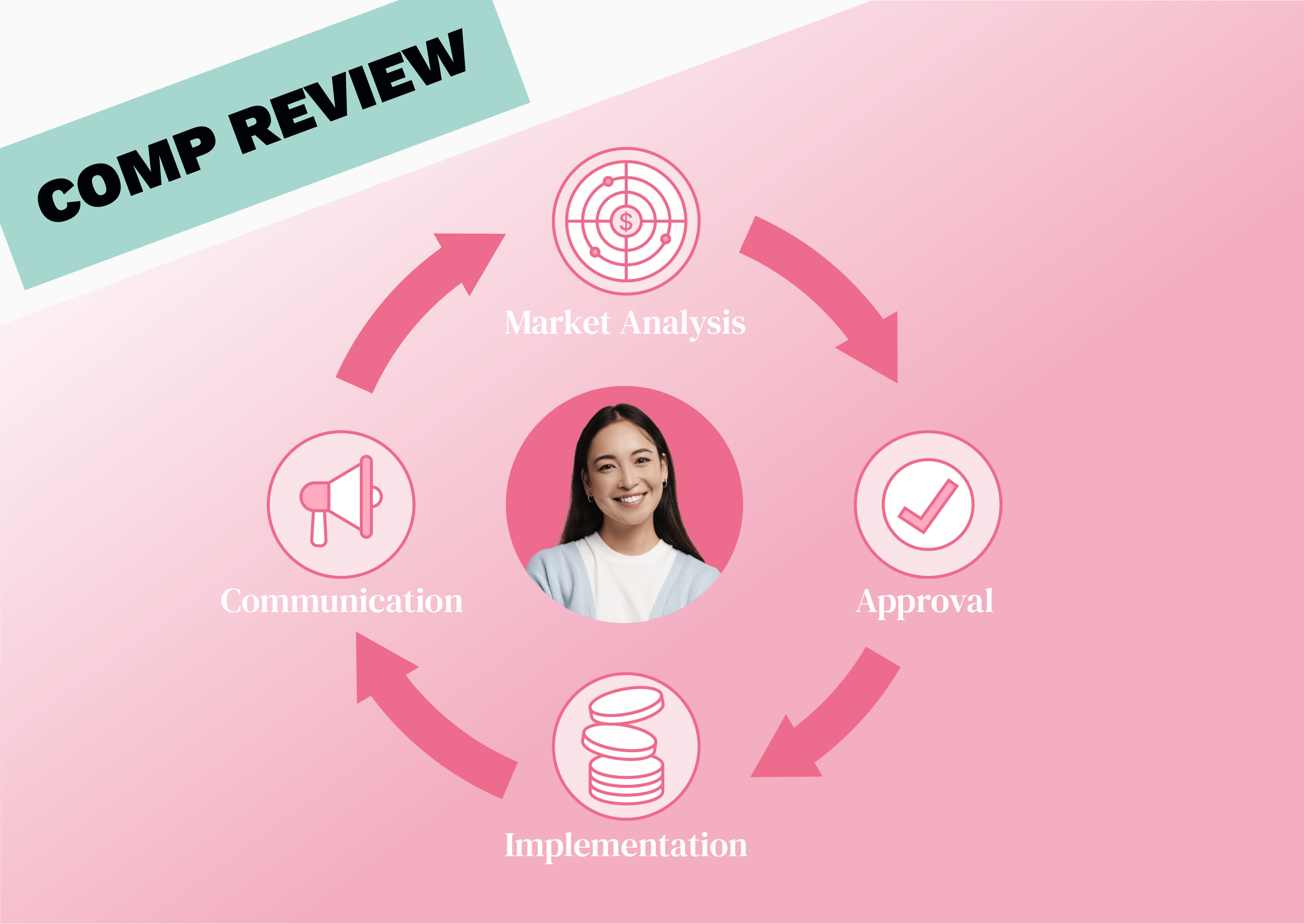It’s no surprise that we love compensation management — it’s what we do best, after all! But while compensation might be our passion, we also recognise that in a fast-moving industry like tech, there are plenty of other things to think about too.
From funding rounds to attracting top talent, shaping organizational culture, and driving business performance, tech leaders have a lot on their plates. But the good news is, that compensation management can help with all of these elements.
In this article, we’ve explored why compensation management should be a priority — and how to get it right.
The Tech Industry Landscape
The tech industry in Europe continues to show signs of strong growth, with companies raising €29.9 billion over the first quarter of 2024. That’s almost twice the €14.7 billion raised during the first quarter of 2023.
Countries leading the way include Sweden, France, Germany, the UK, and the Netherlands. The best-performing industries within the tech sector are cleantech, transportation, and fintech.
As tech companies continue through a period of rapid expansion, the industry is also becoming more competitive. And this creates some significant challenges for HR teams.
That includes an employee-led market, where a top talent shortage means fierce competition. Employees can pick and choose which company they work for and hold stronger negotiating power than in some other industries. This combination can also lead to high turnover rates as companies struggle to provide the pay their employees demand.
To avoid all that, your compensation management strategy needs to be on point.
The Importance of Compensation Management in Tech
Compensation matters to employees — that’s a given. They provide your company with their skills and expertise, and in return, they want fair and equitable compensation. And if you’re not able to provide it, they may think about walking away for a better offer elsewhere.
And in an industry like tech, where there’s a shortage of skilled professionals and a surplus of vacancies, the right compensation makes all the difference to a company’s ability to:
- Attract top talent: Without the right compensation, companies are far less likely to receive applications from top talent. With so many tech companies on the scene, knowing where to position your salaries within the market is crucial. There’s a strong argument for publishing salary ranges on job descriptions, too. Research shows this is a key factor for most candidates when deciding whether to apply for a job or not.
- Retain top talent: Once an employee is onboarded, the hard work doesn’t stop there. A fair and transparent compensation policy can show employees how their pay is determined, and how it might change as they progress within the company. This can help foster a culture of trust, where employees know their worth is valued. A positive workplace culture, where career development is celebrated also boosts loyalty, because employees feel good about where they work, and would rather progress internally than look for another job.
- Engage and motivate its employees: When employees know they’re being paid fairly, they’re more likely to feel engaged and motivated in their roles. And when employees feel engaged and motivated? They’re more likely to perform better. That’s why research from Gallup shows that employee engagement is key to unlocking a range of performance outcomes including company profitability. The same research also found that high engagement reduces turnover rates, because employees are satisfied in their roles.
Challenges and Pitfalls of Neglecting Compensation Management
Compensation management might not always be front of mind for HR teams in the tech sector — but it should be. That’s because neglecting this crucial part of your people management can lead to all sorts of challenges and pitfalls, including:
- Increased turnover rates: When employees don’t feel like they’re being paid fairly, they’re much more likely to start looking for another job elsewhere. And in a fast-paced industry like tech, there are usually plenty of other roles for them to apply for. Your employees might even be headhunted by other companies.
- Decreased employee morale: Low or inequitable wages are bad for employee morale, which can then lead to decreased motivation and productivity. And when employee productivity drops, so does the performance of your company as a whole.
- Damage to your company brand: Employees talk and often have friends who work in the same industry. Over time, paying below-market compensation can lead to a reputation as a company that doesn’t value its employees. You may find this impacts the number of job applications received for open vacancies, in addition to affecting your ability to attract top talent.
If these challenges and pitfalls sound familiar — your compensation management practices might need an overhaul.
Best Practices for Effective Compensation Management
Getting compensation management can make all the difference in an organisation’s performance. That’s why it’s so important to get it right. We’ve rounded up these best practice tips to get you on the path to success.
#1 Carry out salary benchmarking
Salary benchmarking involves comparing your employees’ salaries to market data, so you can check where their pay sits. This data can then be used to make adjustments as the market changes (and in tech, that happens fast).
That’s why salary benchmarking isn’t something you can just do once and then forget about. To ensure competitiveness in a fast-moving sector like tech, it’s crucial to carry out benchmarking at least once a year. Even better, aim for bi-annual reviews.
That might sound like a lot of work, but with a salary benchmarking tool, like the one we’ve developed at Figures, this process is quick and easy. Using a benchmarking tool gives you access to a large dataset of industry-specific data that can be customised to your needs.
This makes it far easier to conduct regular benchmarking to ensure you’re on the right track.
#2 Make sure you’ve got a compensation policy
Your compensation policy is the backbone of any compensation strategy, so this should be one of the first things you work on. This should be driven by your compensation philosophy — which looks at your goals in terms of compensation, and why these goals are important for the company.
Your compensation policy then outlines how this philosophy will be applied in real life, including details around benchmarking, salary bands, reviews, and more.
Read our full guide on creating a compensation philosophy.
#3 Consider each employee’s total rewards
Competitive salaries are crucial, but so are the non-monetary rewards you offer alongside it. Get these right, and you can stand out from the crowd while also creating a positive company culture that gives employees the benefits they’re looking for.
Creating an employee value proposition (EVP) that outlines the total rewards each employee receives can be a key way to attract and retain top talent.
#4 Offer opportunities for development and growth
Most employees want to develop their careers over time, so if you don’t offer opportunities for promotion and growth, they have to look elsewhere. But nurturing your internal talent pipeline is one of the best ways to retain top talent.
Within salary and performance reviews, make time to discuss what each employee needs to do to reach the next stage of their career, and what kind of salary they can expect when they get there.
#5 Make the most of HR tech
HR tech, like salary benchmarking tools, is designed to save time and help you define the most competitive salaries. And it’s only natural that the tech industry was an early adopter of these tools.
From the impact of AI on compensation to salary benchmarking tools, there are plenty of ways that HR tech can support and streamline your operations.
We recommend Figures’ Salary Benchmarking Tool as a great place to start.
The Role of Leadership in Compensation Management
Your HR team might know the importance of compensation management — but buy-in from your leadership team is a crucial part of the puzzle.
Driving fair and equitable pay practices needs to come from the top, which means executive support is essential for creating and sustaining successful compensation strategies.
To get leadership on board, we recommend outlining:
- What you can achieve with the right compensation management practices (with a focus on increased performance and profitability)
- Why now is the right time (because the tech industry is going through a period of rapid growth, so you need to stand out in a competitive market)
- What problems this will solve (attracting and retaining top talent)
Real-Life Success Stories: How Tech Companies are Transforming Compensation, with Figures
They say the proof is in the pudding — that’s why we’ve rounded up these success stories, so you can see what a difference Figures makes.
How Slimmer AI created an equitable compensation strategy, with Figures
When Slimmer AI, an artificial intelligence tech company based in the Netherlands, wanted to create a more equitable compensation philosophy, People Lead Elsa Berg knew she needed access to high-quality, up-to-date pay data.
Initially, Berg’s strategy for finding salary benchmarking data was to trawl internet reports and speak with industry connections. But this method wasn’t only extremely time-consuming — it was often inaccurate.
Instead, Slimmer AI switched to using Figures to inform its salary benchmarking process. To help this transition, Berg ran compensation sessions with employees, designed to explain where Slimmer AI salaries sit within the wider market, how pay is calculated, and how the HR team ensure a fair and equitable process.
Want to know what Slimmer AI achieved? Here’s a rundown of their results:
- Identifying which employees were being paid above or below their target, and then adjusting these salaries in line with expectations.
- Quickly and easily running bi-annual salary reviews, to help check pay is on target and inform salary negotiations.
- Benchmarking the entire company in moments, not hours.
How Lucca attracted a world-class team to support their rapid growth, with Figures
When HR software company Lucca entered a period of hypergrowth, the HR team knew they needed to adjust their compensation strategy in order to attract the top talent they needed to continue expanding successfully.
HR Manager, Charles de Fréminville, knew they could no longer rely on basing salaries on historical data and internet research. They needed a better way. Enter Figures.
Using Figures benchmarking data, the HR team could check the salaries on offer for new hires were competitive, helping them hire the top talent. The HR team also completed comprehensive salary reviews, ensuring that every employee was being fairly compensated.
- Bi-annual salary reviews are carried out to boost motivation and retention. With Figures, these reviews are quick, easy, and accurate.
- A transparent salary grid is used to show every employee where they stand — and where they could go.
- Salary benchmarking data from Figures helped inform Lucca’s scalable salary policy — crucial for securing Series A funding worth €65 million.
Taking the Stress Out of Compensation Management
When it comes to getting compensation management right, there are a lot of moving parts. And in a fast-paced industry like tech, the pressure is on. Using a platform like Figures helps you make fair and efficient salary decisions — minus any stress.
Ready for more compensation management insights? Sign up for our newsletter, and we’ll tell you everything you need to know.




.avif)

